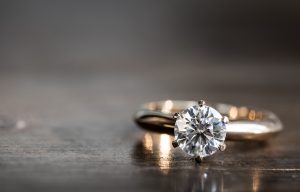It was a beautiful night – the moon was bright the stars were shining and the velvet box was opened to reveal a sparkling diamond. Slipping the ring on her finger, the couple was now engaged to be married – you could almost hear wedding bells in the distance. But not many moons had passed when storm clouds brewed, the wedding was canceled and the ring – well that’s the thing- was it a gift bestowed on the recipient or should it be returned to the donor? The answer to the question is not always that clear.

Once upon a time there was a statute in New York which was colloquially referred to as the ‘heart-balm’ statute,
(Civ. Prac. Act, Section 61– b, – d 1935) which prohibited “actions to recover damages for breach of promise to marry” and also prohibited “suits to recover specific real or personal property in contemplation of marriage” Gaden v. Gaden 29 NY2d80 Court of Appeals 1971.
From 1935 until 1965 the so called heart balm statute did not allow for recovery of an engagement ring, or other gifts, in contemplation of marriage, so that, in the event of a broken engagement, the recipient of the ring would be entitled to retain it.
In 1965
“section 80–b of the Civil Rights Law was enacted to legislatively change our interpretation of the heart balm statute… that a person, not under any impediment to marry… will no longer be denied the right to recover property given in contemplation of a marriage which has not occurred.” (see Gaden).
In other words, if a ring is given with the intention of getting married, and the marriage does not occur, the donor of the ring has the right to recover the ring as long as there was no viable reason that the wedding could not take place.
Still confused? – so what exactly is an ‘impediment to marry’. In Lowe v. Quinn 27 NY2d 397 Court of Appeals 1971, the Court held that a married man who was awaiting his divorce and had given an engagement ring to his new girlfriend could not recover the ring when she broke off the engagement. The reason was that since “one of the parties is married, an agreement to marry under such circumstances is void as against public policy…and it is not saved by the fact that the married individual contemplated divorce.” To be clear, in this case since the groom-to-be was still married and the engagement was broken off, the bride-to- be would keep the ring.
But what if the bride- to- be is still married when the future groom presents her with a ring and she subsequently breaks the engagement. Does she keep the ring because her marriage was the impediment to a new marriage and therefore recovery should be precluded? Not always. In a recent case, Lipschutz v Kiderman 905NYS2d247 (2nd Dept. 2010) the Appellate Court remanded the case back to the trial court to determine whether or not the husband- to- be had knowledge that his fiancee was still married, holding that ” recovery in such cases is not intended to bar an action for the return of property to an innocent party, not aware of the other’s disability to contract a marriage at the time of the ‘engagement.'” The implication here is that the giver would be able to recover the ring if he had no knowledge that his fiancee was still married, however if he knew that she was still married at the time and gave her the ring anyway, the fiancee would keep the ring.
There are other circumstances where the recipient might retain the engagement ring, such as if the ring were presented to the recipient as a birthday present. “If there were reasons other than a contemplated marriage why the gift was given, such as part of a birthday or holiday celebration, the ring may not be subject to return. Where there is a genuine dispute as to the circumstances under which the ring was given, a trial is necessary to determine the facts.” 11 NY Practice New York Law of Domestic Relations Section 4:4, Courtship: Engagement Rings [2002] In other words, if the giver presents the engagement ring to the prospective bride on her birthday, or on Valentine’s Day, and the engagement is subsequently broken, he may not be entitled to recover the ring.
Lastly, if the couple does get married, but subsequently divorce, the engagement ring, which was given prior to the marriage is considered to be the recipient’s separate property and is not subject to return.”The marriage turned a gift that was conditional into one that was unconditional.” Epstein v. Epstein, 289 AD2d78. As to jewelry which is given during the marriage rather than before the marriage – that jewelry is marital property, and that is a discussion best saved for another day.


